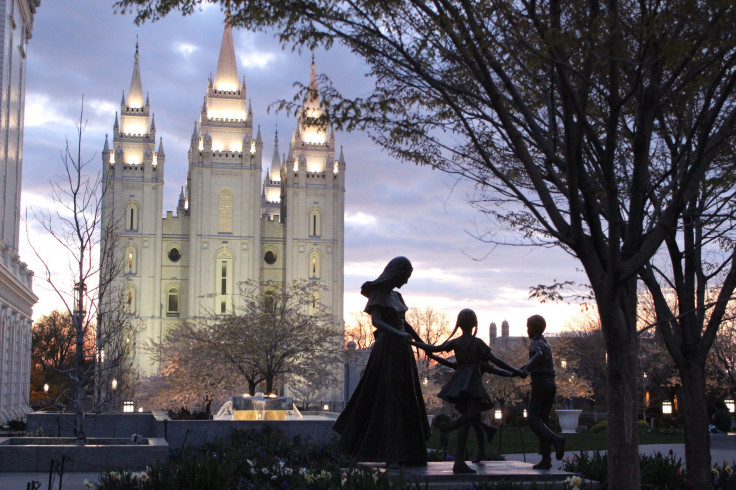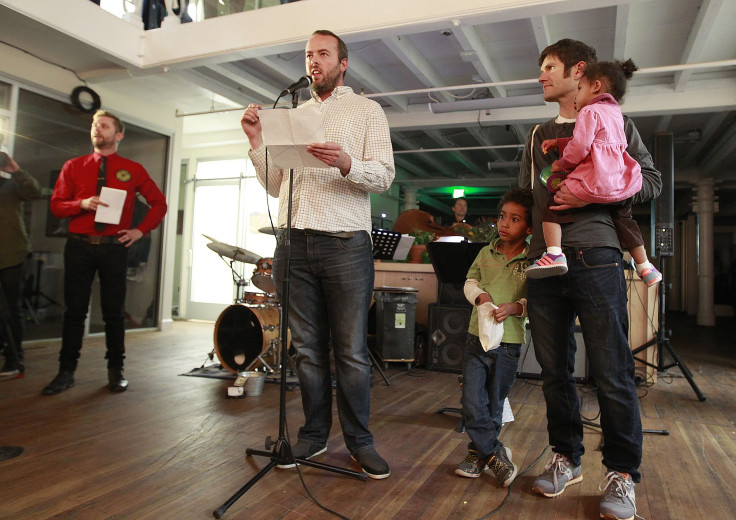Mormon Mass Resignation Highlights Harsh Struggle Members Face When Leaving LDS Church

In a spiritual sense, Brock Murphy left the Church of Jesus Christ of Latter-day Saints eight years ago. This weekend, he’s going to make it official.
Murphy plans to attend the “Mass Resignation From Mormonism” event in Salt Lake City on Saturday, where organizers are expecting at least 750 people to formally renounce their affiliation with the LDS church and submit the necessary paperwork to be removed from the church’s rolls. The demonstration, the fifth of its kind in three years and expected to the largest thus far, is the result of a backlash from Mormons who are unhappy with a new church policy that bans children of same-sex couples from being baptized in the church and formally declares that Mormons in gay marriages are considered apostates.
But the logistics of the event, which will be held in a park across the street from the church’s world headquarters and will feature an attorney on site to represent Mormons who want to leave, also serves to highlight what some familiar with the church say can be a difficult process to sever ties with an organization that actively tries to persuade members to stay.

“We want to make a statement to the church that this policy is discriminatory and harmful,” says Lauren Elise McNamara, one of the event organizers and a Mormon convert who says the new policy was the push she needed to finally leave the church. “But primarily, we want to offer a place of support and safety for people to resign.”
“This is not a church that is easy to leave,” she added.
Eric Hawkins, a spokesman for the LDS church, told International Business Times in an email that a member who wants his or her name removed from church records “can write to their local congregation leader (bishop), who would process the request.”
Jumping Through Hoops
But Murphy, 32, says it’s not always so simple. He had been an active member of the church while growing up but says he began to have doubts about Mormon teachings starting around age 17. When he was 24, he took a big step: He wrote a letter to the church’s membership office, asking to be removed from its records. What ensued, according to Murphy, was a lengthy process that resulted in a sort of stalemate.
He first received a letter from the church informing him that the issue was a local matter that must be resolved by his bishop. Soon after, Murphy says, a bishop appeared at his doorstep, wanting to discuss the seriousness of Murphy’s decision. When Murphy insisted that he understood the repercussions, the bishop explained that Murphy’s original letter was not sufficient for his removal, and that Murphy would have to submit another letter to his local bishop directly. Fed up, Murphy did not pursue it further.
“I felt I had taken every step to legally resign and refused to cave to the church's own rules on the matter. I had put it behind me and didn't see the point in jumping through extra hoops,” Murphy says.
But after the new policy became public last week, Murphy decided he wanted his name off the books for good. “I thought I had washed my hands of the church, but I'm following through because of this new change … and also to support my sister who is also resigning.”
Murphy’s story isn’t unique. Mark Naugle, an immigration attorney in Salt Lake City whose entire family left the church when he was 15, says that both the social pressures in a place like Utah, where the vast majority of the population is Mormon, and the official steps required to be stricken from membership lists can make it difficult for Mormons who no longer want to be identified as such.
“It’s extremely difficult because your entire community is ingrained within the church. Your local leaders may show up at your house, try to schedule meetings with you to come back, your family and friends could learn embarrassing details about your life,” Naugle says. “There’s no easy way out.”
However, Naugle said if members get an attorney like him involved in the process, the church is much less likely to put up a fight. Members can give Naugle power of attorney to represent them in their communications with the church. Naugle then sends a letter on their behalf to church headquarters requesting removal, and the matter is typically resolved between five and 15 days -- versus the months or sometimes years it can take otherwise, he says.
Before the new policy regarding children of same-sex couples became public, Naugle had performed the service, pro bono, for about 300 people. Once it was widely known, Naugle made a post to Reddit offering his services for anyone interested. In the last week, he has received 2,000 emails requesting his help. Naugle will be at the demonstration Saturday, where attendees will complete their resignation letters, get them notarized, may choose to have Naugle submit them, complete a peaceful march around Temple Square, and then physically drop the letters in a mailbox nearby. Speakers will be on hand to share their experiences during the proceedings.
First Presidency clarifies Church Handbook changes. pic.twitter.com/88Iae0CDhc
— The LDS Church (@LDSchurch) November 13, 2015Some Mormons say that, in recent years, the process has gotten easier. Several members on a Facebook page for Saturday’s mass resignation said that they were not contacted by bishops after they submitted their letters of resignation and that the process was mostly smooth and efficient.
“I was genuinely surprised and pleased to find how easy it was, at least in my case,” says Tracy Mutter, a 53-year-old seamstress who lives in a suburb of Salt Lake City. She resigned earlier this year, she says, after being inactive in the church for more than a decade, because local ward members started visiting her, pushing her to be active once again -- a common complaint of inactive members who haven’t formally resigned from the church.
“I realized I really did have to make it official, whatever the difficulty involved, to put a stop to what would undoubtedly become a constant barrage of members trying to ‘fellowship' me into faithful activity,” Mutter says. “I think part of why I wasn’t contacted in person by the local bishop is that I only moved to this area a year ago and he didn’t know me personally. The firmness of my letter may have played a part, but I really don’t know.”
Brian C. Madsen, a former Mormon who lives in Los Angeles, adds that the emotional closure is important as well. “By having my name removed, I’ve drawn a line in the sand and said, ‘At this point, it’s over.’”
Others say that they don’t want to inflate the church’s membership numbers -- it claims 15 million members worldwide -- or their names to be affiliated with a church whose policies, like the most recent exclusion of children of same-sex couples, they abhor. On Friday, the church issued a clarification on its policies, explaining that children who have already been baptized will not be asked to leave the church, and that those who haven’t could still receive blessings and would be able to participate in church activities. [In order to be baptized, they must renounce same-sex marriage at age 18 and move out of their parents’ home.]
“We don’t want to see anyone leave the church, especially people who have been struggling with any aspect of their life,” Hawkins says. “We hope that today's guidance from church leaders and the additional commentary will help provide understanding and context to some who may be considering resigning their membership. It’s extremely important that our members read what leaders have said, and do not rely on other sources or interpretations or what people think they have said.”
For Murphy, no amount of context can change his mind.
“If you’re struggling to find happiness in the church, it’s OK to leave and find happiness somewhere else,” he says. “You don’t have to cave to those pressures.”
© Copyright IBTimes 2024. All rights reserved.











